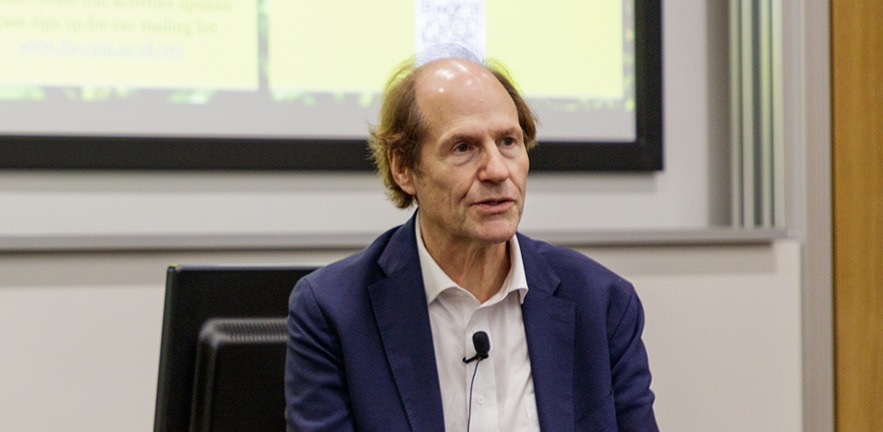Behavioural nudges can make a big difference to battling climate change, says Cass R Sunstein, a Harvard professor and Fellow at Cambridge Judge Business School.
How can behavioural “nudges” to individuals change people’s decisions relating to climate change, and can that make a big cumulative difference?
Cass R Sunstein, Robert Walmsley University Professor at Harvard University and a Fellow at Cambridge Judge Business School, recently talked at Cambridge Judge about “Policies to Navigate Climate Change”. He spoke at a packed “Fireside Chat” with Professor Mohammed El-Erian, President of Queens’ College, Cambridge, which was organised by the El-Erian Institute of Behavioural Economics and Policy at Cambridge Judge and introduced by the Institute’s Director, Professor Lucia Reisch.
Professor Sunstein is the author of numerous books including How Change Happens, Why Nudge, and Sludge: Bureaucratic Burdens and Why We Should Eliminate Them, and he has served in government including as Administrator of the Office of Information and Regulatory Affairs in the administration of President Barack Obama.
Reflecting his recent talk, Professor Sunstein shares here some of his thoughts on behaviour relating to climate change, on recent tremors in the banking sector, and on how to channel the Beatles in fighting global warming:
The Intergovernmental Panel on Climate Change makes clear that individual decisions are crucial to global efforts to combat global warming and climate change. In Switzerland, making green energy the “default” for consumers (even if more expensive) resulted in most consumers – as well as companies large and small – staying with the green default over several years, even though it was easy to switch to less-green options.
Inertia played some role in what happened in Switzerland, but not the only role. People are also subject to peer pressure, and switching from the default green option may signal to some people that one is a creep.
People may accept government “subsidies” far more readily than “taxes”. This is true in combatting climate change as shown by the positive reaction – in the US, at least – to green subsidies offered to American companies through the Inflation Reduction Act. The word “subsidy” doesn’t have the same toxicity as the word “tax” sometimes does – and this is true even if others receive the subsidy.
I have been lucky in being able to go back and forth between academic life and government. I was teaching at the University of Chicago when a young faculty member joined us named Barack Obama. But there’s a big difference between the two fields: academia reveres creativity and originality, while government reveres problem-solving and can be suspicious of originality that doesn’t solve problems.
The collapse of Silicon Valley Bank in the US can’t be viewed in isolation. The networked nature of banking and finance means that when a bank of any significant size fails, people feel they might be at risk and will react – though that doesn’t necessarily mean a run on other banks. Cambridge economist John Maynard Keynes captured the behavioural aspect of this in his writings in the 1930s on “animal spirits.”
I’m an optimist that humankind can find ways to deal with climate change. As the Beatles song says: We can work it out. Governments must avoid making it difficult for companies and individuals to pursue green alternatives through sludge, or unnecessary bureaucracy that amounts to a tax – that toxic word – on people’s time.


